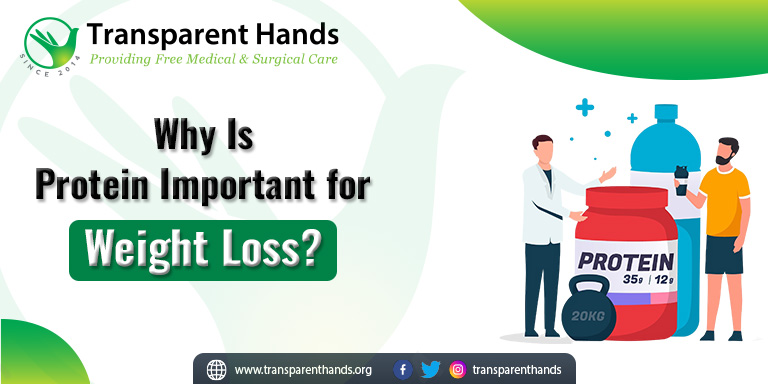Why Is Protein Important for Weight Loss?

Recent studies indicate that diets with a high proportion of protein lead to greater loss in weight and fat compared to diets with lower protein levels. Additionally, according to recent research, around 30% of the calories from protein are burned while metabolizing and digesting it. This rate is significantly higher than that of fat and carbs. All this means that protein consumption can be beneficial for people who are considering ways to lose weight. In this article, we’ll explore how protein can help you maintain a healthy weight.
Make Preventive Healthcare Accessible to the Needy
How to Increase Protein Intake for Weight Loss?
A high-protein diet can help curb your hunger while also assisting you in losing weight. To ease into it, start with small changes like swapping your morning cereal for eggs or focusing on eating your protein first when you sit down to eat. These simple steps make it easier to get used to the new diet.
Here’s how you can elevate the levels of protein sources in your meals:
- Incorporate protein-rich foods such as meat, salmon, and milk into your meals.
- Replace low-protein breakfast options with eggs, which provide protein along with essential nutrients. A recent study found that eating two eggs at breakfast time keeps you full for longer and reduces calorie intake during the day.
- Almonds contain 6g of protein in a 28g serving, which is why they are a good source of protein.
- Include protein shakes in your breakfast. A single scoop (28g) of whey powder provides us with approximately 17g of protein.
A study reported by the American Heart Association looked at how protein affects weight loss. They studied 65 overweight but healthy people, split into two groups. One group had a diet with 12% protein, while the other one had a diet with 25% protein. Both groups could eat as much as they wanted. After six months, the high-protein group lost more weight. They lost about 19.6 pounds, while the low-protein group lost only 11.2 pounds. This suggests that eating more protein might help with weight loss.
How Much Protein Do You Need for Weight Loss?
Protein is a nutrient that plays an essential role in building and maintaining the health of your body, including your muscles, skin, and bones.
The recommended percentage of daily calories from proteins is typically 10% to 35%. To lose weight, one needs to ensure a regular intake of between 1.6 and 2.2 grams of protein per kilogram of body weight. For athletes, there is a different requirement. They should consume about 2.2-3.4 grams of protein per kilogram for weight loss.
The Recommended Dietary Allowance (RDA) of protein is 0.8 g per kilogram of body weight (g/kg/bw). According to a study, moderately higher protein intake (1.0 g/kg/d) at 20% of energy intake is successful for weight loss.
What are the Benefits of Taking Folic Acid?
How Does Protein Help You to Shed Pounds?
Protein takes a significant amount of time to digest as compared to carbohydrates. This helps you stay full for a longer period of time and prevents you from eating more which automatically cuts down the calorie count.
When you eat protein, it helps reduce the buildup of harmful fats in your body. Moreover, your body burns calories as it breaks down food and turns food into energy for your body. This is called the thermic effect of food (TEF). Your body burns even more calories when breaking down proteins than carbohydrates as protein has a higher TEF.
According to research mentioned by the National Institute of Health, extended clinical trials of 6–12 months have demonstrated the effectiveness of high-protein diets (HPDs) in weight management. These diets not only promote weight loss but also help prevent weight regain after successful weight reduction.
Benefits of Protein
A protein-rich diet offers numerous health benefits. It promotes muscle development and helps maintain healthy muscle mass while supporting weight management by reducing overeating tendencies. Adequate protein intake contributes to balanced blood sugar levels. Additionally, it plays a crucial role in bone metabolism. A study published by the National Institute of Health reveals that consumption of two to three meals a day, each containing ~25–30 g of high-quality protein, is optimal for the stimulation of 24-hour muscle protein synthesis (MPS) in healthy adults.
Heal Lives Through Free Medical Camps
Conclusion
Consumption of the right amount of protein is essential not just for weight maintenance but also brings us other health-related benefits. Consider updating your daily diet and meal plans to increase your intake of protein and lose weight in a healthy way. The quantity of protein you consume daily depends on your current weight and lifestyle. To raise awareness about how to maintain a healthy weight, Transparent Hands has launched multiple initiatives. Support our ongoing efforts to ensure a healthier future.











Leave Your Comments